Route: X29, Tywyn to Machynlleth
Operator: Lloyds Coaches
Frequency: Every 2 hours (Mon-Sat); 2 per day (Sunday)
Time: 35 minutes
Cost: Part of £6 1Bws Day Ticket
Date of Trip: 17/9/22
Whole Lotta Bus: Ian & El
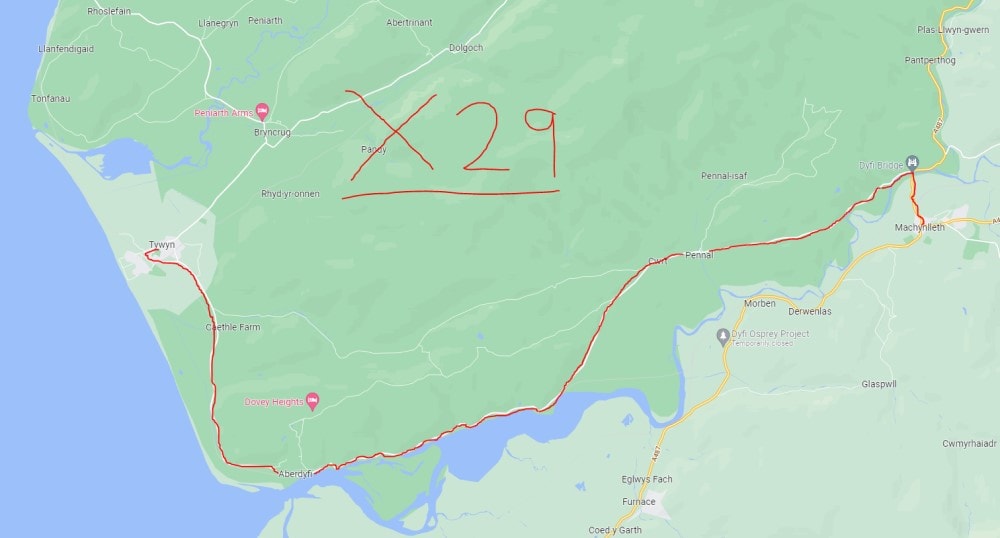
Just as an undiluted splash of Mancunians and Scousers swirl around the seaside spots of the North Wales seaboard, almost everybody along the coastline west of Cader Idris is from the West Midlands. There’s the vowel-mangling chippy owner in Fairbourne, the self-proclaimed ‘Yam’ bus driver who shuttled us from there to Tywyn on the #28, and the group from Redditch who jump off it a couple of stops earlier than planned thanks to a sudden bout of travel sickness. The only local we encounter is the waitress in a cafe on Tywyn’s main drag. She’s so well-spoken that my apple crumble curtseys as she places it down.
Once refuelled, we make it to the bus stop with a few minutes to spare, where we chat to a gregarious couple from – where else? – Wolverhampton. They’re heading over to Pennal, a village a few miles outside Machynlleth, from where they’ll take the rest of the afternoon to hike the eight miles-or-so back to base.
‘Pennal rings a bell,’ I say to them as the bus arrives. ‘But I’ve absolutely no idea why.’
‘Well, let us know if you figure it out,’ the woman says while fanning the air in front of her face. ‘You could get a good tan on here. I might come and do a bus holiday next year.’
Tywyn is modest by family resort standards. It doesn’t have the funfairs and arcades of its almost namesake, Towyn, near Rhyl. Nor are there any of the ornate verandas that line the busy shopping streets of Llandudno. It doesn’t reel visitors in with a honeypot harbour or the sublime estuarine views of Barmouth. Instead, it revels in its relative seclusion and state of nondevelopment.
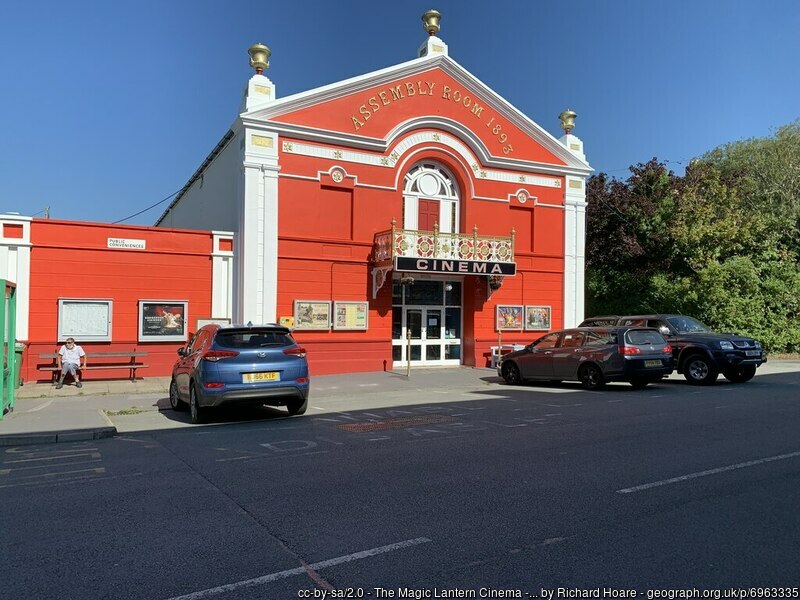
There’s also the extraordinary Magic Lantern Cinema. Painted the vivid red of watermelon flesh, it’s a beacon that lights up the top of the high street. Neither is it there just to pander to holidaymakers. It has a screening of Welsh-language horror, Gwledd coming up, highlights from the Sheffield Adventure Film Festival, and – prog enthusiasts rejoice – there’s even a 50th anniversary performance of Tubular Bells.
We set off downhill, the glint from a small solar farm poking into our eyes to the right. It’s on the site of where my Grandad Dennis did his national service in the 1950s. Exiled 125 miles from his Sheffield home, he hated every minute. One of his intake was a lad from a croft in the Outer Hebrides, a native Gaelic speaker with faltering English, inevitably nicknamed ‘Jock’. In mute protest at his situation, he barely opened his mouth for the entire two-year stay.
The route out-of-town takes us past the Talyllyn Railway. The world’s first volunteer-run heritage line when it changed hands in 1951, it chugs the 12km from here, along the Dysynni Valley, to Abergynolwyn. More Midlanders join the bus, too. A family of four squeeze onto two seats across the aisle, a younger couple dash to the back row, while a septuagenarian sits right in front of us. He’s silent for most of the trip, apart from two explosive sneeze-cum-coughs that he doesn’t cover his mouth for, but he still takes out a hanky to swat at the invisible particles now ricocheting around the carriage.
The short road to Aberdyfi wends its way through the meeting point between hill and sea. Sheep-filled fields slant towards unseen sands to the right, with the lower slopes of the Cader Idris range clambering out from the greenery opposite. The single-track train line shadows us as we edge closer to the waters of Cardigan Bay, until the dune-laden golf links bar any further encroachment.
Aberdyfi is stunning, especially on a day as bright as this, when retina scorching reflections bounce off the Dyfi Estuary. Pastel townhouses rub up against water as blue as unworked copper, where yachts and fishing boats and paddle boarders bob among the ripples.
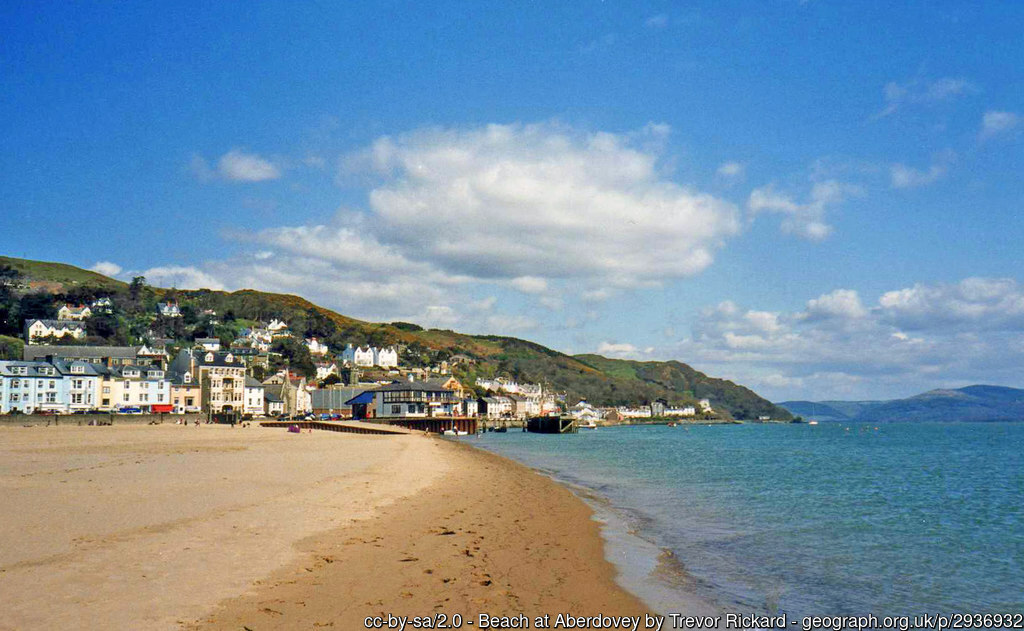
The southern flank of the Dyfi is at both its nearest and furthest points here. The Ynyslas Sand Dunes congeal into a peninsula at the mouth of the river, just a few hundred metres from the northern esplanade. That jutting tranche holds back silty shallows carved by the Dyfi and its lesser tributaries: Afon Cletwr, Afon Leri and Afon Ddu. They help create a brackish expanse more than a mile-and-a-half wide, framed in the background by forested foothills that eventually lead to Plynlimon, the source of the Severn and Wye.
It’s as we pass beneath the bridge for Penhelig railways station that I have a revelation. I tap the guy from Wolverhampton on the shoulder. ‘I’ve figured out why I know Pennal,’ I say. ‘Robert Plant lives there. Or used to have a house there. Something like that. It’s another Black Country connection, anyway.’
‘That’s not a surprise,’ he replies. ‘You can’t move for us lot round here.’
It turns out I wasn’t too far off the scent. In the 1950s, Robert Plant’s family holidayed outside the village at a cottage called Bron-yr-Aur, an isolated bolthole without electricity or running water. As well as name checking it in a pair of Led Zeppelin song titles, Plant and Jimmy Page bashed the likes of Stairway to Heaven and Immigrant Song into shape while decamped here in 1970.
The route ahead ushers us through astounding views of the estuary, passing inlets and microscopic coves and frequent train tunnels. We’re a scant few yards back from the water, but there’s nothing but air and a short drop separating the carriages from the briny depths. The road twists with each gouge taken out of the land, every bend revealing stupendous vistas that run the gamut of greens from breezy peppermint to gungy kelp.
Salt marshes extend their mossy tendrils into the river, consuming the foreshore and funnelling the Dyfi into becalmed channels and creeks. All the while, The Tarrens – Cader Idris’s southern range – make leaving the main trail a precipitous prospect. As far as drama goes, this is right up there with the stretch of railway between Exeter and Newton Abbott, and whichever mode of transport you prefer, you really need to see it.
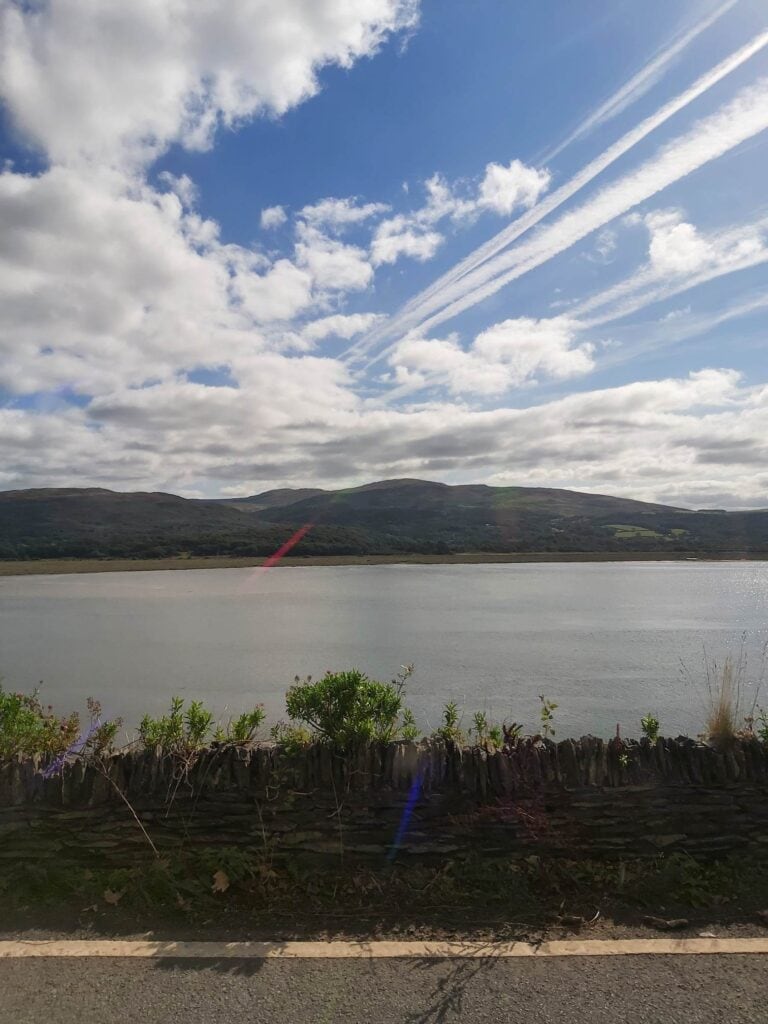
A front garden festooned with dozens of sunflowers marks our arrival into Pennal. You can see why the Plant family would want to spend their summers here; brightly painted homes sidle up to stone cottages, all within earshot of the village’s eponymous burbling stream.
The couple from Wolverhampton ding the bell. ‘Right, it’s the stairway to heaven for us now,’ the man says of their not insignificant inland slog back to Tywyn. ‘We’ll keep an eye out for any passing rock stars.’
It’s a gentle waltz on the final few miles towards Machynlleth. A red kite swirls away over the river, its fanned and forked tail unmistakable even in silhouette, even if it’s encroaching into contested territory: the Dyfi Osprey Project is on the opposite bank.
The Dyfi is at a gentle trickle. Perfect conditions for skimming. A group of gym enthusiasts busy themselves skipping stones across the ripple-free surface downstream of the two-hundred-year-old bridge that leads into town. Its replacement, a viaduct that will sit above the floodplain – removing the need for a thirty-mile detour when the current crossing becomes inundated – and will have cost the thick end of £50m when it opens in 2023, is under construction a few yards away.
The market isn’t on today, so I won’t be able to indulge in a cruffin as I did when here with Luke a couple of months ago. Not that El is too fussed. ‘What a fantastic route,’ she says, as we set off to poke around the bric-a-brac shops before heading off for a night in Aberystwyth.
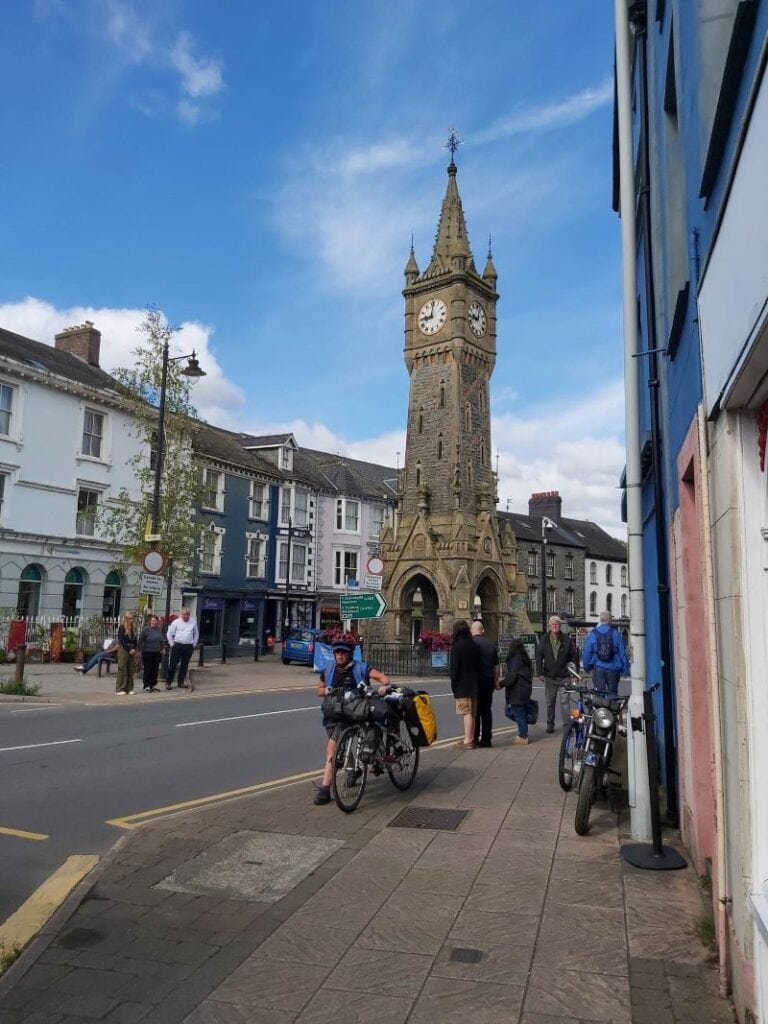
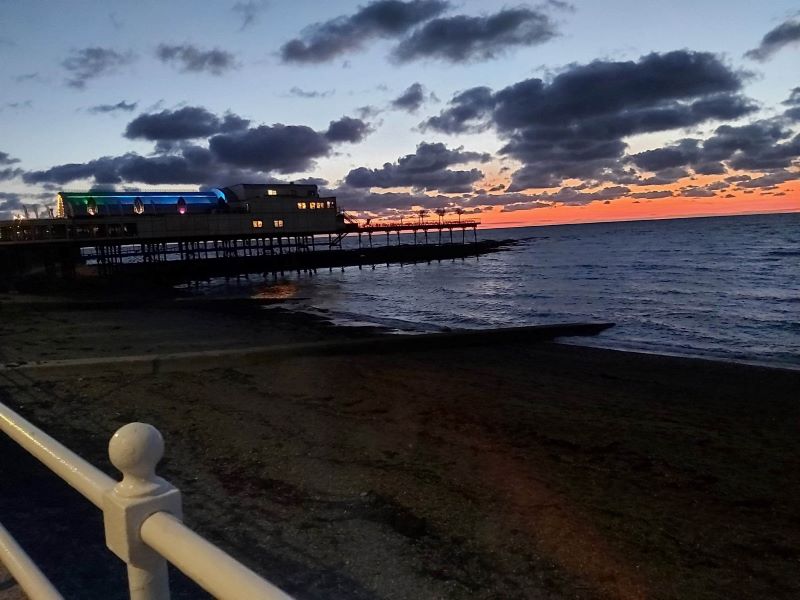
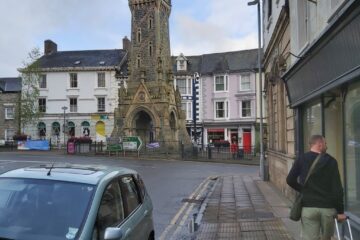
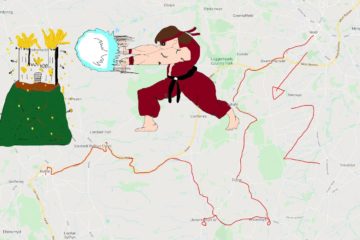

0 Comments